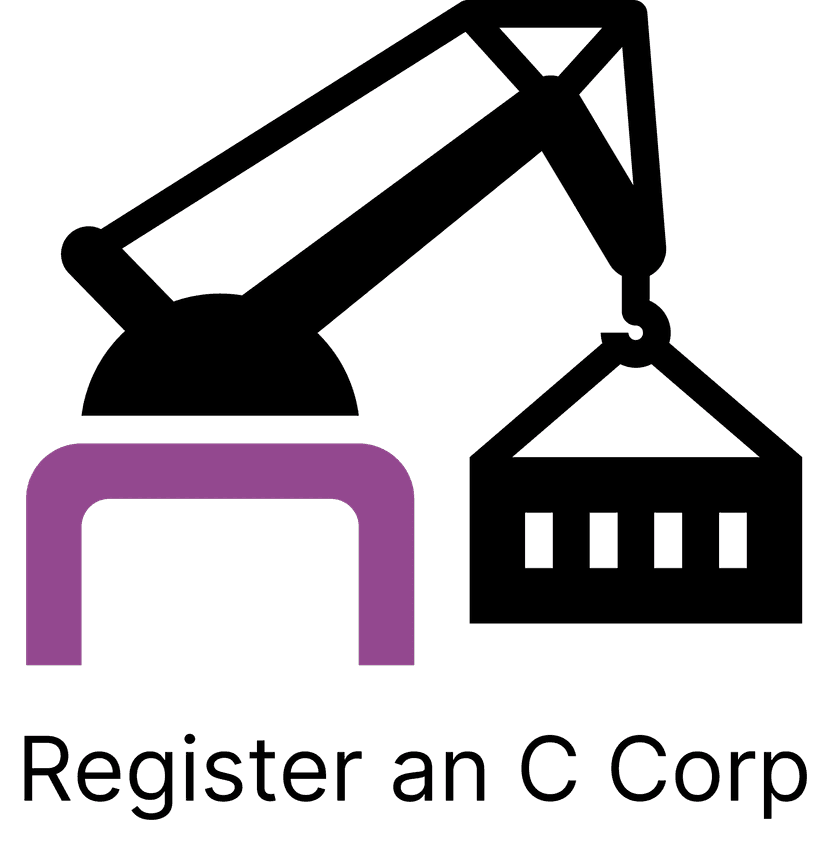Open a C-Corp

How do I open up a C Corp?
A C-Corporation, or C-Corp, is a type of business entity that is legally separate from its owners and shares its profits with shareholders. It is subject to corporate income tax, and its shareholders are also taxed on dividends.
By taking the time to carefully plan and structure your C-Corporation, you can set the foundation for a successful and thriving business, providing limited liability protection and potential tax advantages as you grow and scale.
9 Steps to Open a C Corp
To open a C-Corporation, follow these steps:
- Choose a unique business name that complies with your state's naming requirements. You can typically check name availability through your state's Secretary of State website. Most states require that the name includes "Corporation," "Incorporated," "Limited," or an abbreviation of one of these terms.
- Appoint a board of directors and corporate officers. The board of directors is responsible for making major decisions for the company, while officers manage day-to-day operations. You will need to decide on the number of directors and their respective roles, as well as appoint a President, Secretary, and Treasurer at a minimum.
- File Articles of Incorporation with the appropriate state agency and pay the required filing fee. The Articles of Incorporation contain basic information about your C-Corp, such as its name, address, and purpose. Filing fees vary by state, and the process can typically be completed online through your state's Secretary of State website.
- Obtain an Employer Identification Number (EIN) from the IRS. This is a unique nine-digit number assigned to your business for tax purposes. You can apply for an EIN online through the IRS website, and the process is free.
- Create corporate bylaws outlining your company's structure and governance. Bylaws are internal documents that detail the roles and responsibilities of directors and officers, voting procedures, and how to handle disputes. You can use templates provided by services like LegalZoom or Rocket Lawyer, or consult an attorney for assistance.
- Issue stock and establish a stock ledger to record ownership. Determine the number of authorized shares, the par value of each share, and the classes of stock (such as common or preferred). A stock ledger helps track the ownership of the company, including stock issuance and transfers.
- Open a dedicated corporate bank account. This helps separate personal and business finances, which is important for maintaining limited liability protection. Most banks require your EIN, Articles of Incorporation, and a board resolution authorizing the opening of the account.
- Obtain any necessary permits or licenses for your business. Depending on your industry and location, you may need specific permits, such as a sales tax permit, professional licenses, or local business licenses. Check with your local government and industry-specific agencies to determine the requirements for your C-Corp.
- File for S-Corporation status if desired, using IRS Form 2553. An S-Corp is a special tax designation that allows for pass-through taxation, which can be beneficial for some businesses. Consult a tax professional to determine if S-Corp status is right for your C-Corp.
As you embark on your journey to establish a C-Corporation, it's essential to research and understand the requirements specific to your state and industry. Additionally, consider consulting with legal and tax professionals to ensure that you make informed decisions and comply with all necessary regulations.
Once your C-Corp is up and running, remember to stay on top of your annual reporting and tax obligations. Many states require annual reports and franchise tax payments, and you'll also need to file a separate corporate income tax return with the IRS.
It's one thing to know how to open a C Corporation, but that is worthless if you don't know when you should do it. Let's break down the relevance of this question based on two high level categories. We'll walk through an explanation as well as provide a score, 1-10, that shows you how relevant this question is whether you do or don’t have a product.
Pre-Product: 3/10
The first scenario we will walk through will be if you do not have a product yet. Whether it is a website or a mobile app, you are still in the ideation or planning phase and have not yet built anything. Maybe you have started development but just aren’t finished with your first version. Whichever it is, we'll get into why this question is or isn’t relevant and why you should or shouldn't care about it if you do not have a product.
If you do not yet have a product yet, opening a C-Corp may not be necessary until you have developed a viable product or service to offer. However, establishing a C-Corp early on can provide legal protection and help you attract investors.
Live Product: 6/10
The second category is if you do have a live product. Maybe you just launched your business or maybe it's been live for years and you're continuing to improve its quality and release new features. Regardless of the scenario, if your product is live, this question carries a different weight of relevance.
If you have a live product you are selling, opening a C-Corp may be beneficial as it can provide limited liability protection, potential tax advantages, and a more professional image for your business. It may also make it easier to raise capital and attract investors.
Here are the top 5 tools and services that can help you open a C-Corp:
- LegalZoom: A popular online legal service that can assist with filing Articles of Incorporation, obtaining an EIN, and providing registered agent services.
- Rocket Lawyer: Offers customizable legal templates, including bylaws and operating agreements, as well as assistance with incorporation and registered agent services.
- Incfile: Provides affordable and comprehensive incorporation services, including EIN registration, bylaws creation, and registered agent services.
- Northwest Registered Agent: Offers incorporation services, registered agent services, and assistance with annual compliance requirements.
- Stripe Atlas: A platform designed to help entrepreneurs form a C-Corporation, open a bank account, and access resources to help grow their business.
- A C-Corporation is a legally separate business entity that distributes profits to shareholders and is subject to corporate income tax.
- Opening a C-Corp involves choosing a unique business name, appointing directors and officers, filing Articles of Incorporation, obtaining an EIN, creating bylaws, issuing stock, and opening a corporate bank account.
- Opening a C-Corp may not be necessary if you do not yet have a product to sell, but it can provide legal protection and help attract investors.
- If you have a live product, opening a C-Corp can offer limited liability protection, tax advantages, and a professional business image.
- LegalZoom, Rocket Lawyer, Incfile, Northwest Registered Agent, and Stripe Atlas are top tools and services to help you open a C-Corp.

